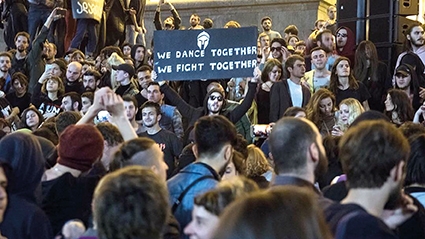One Year Since the “Rave Revolution” - Has Anything Changed?
In the early hours of 12 May, 2018, when riot police stormed two clubs in Tbilisi, a wave of protest spread across the city.
Hundreds of dancers were swaying under the flashing strobe lights to a pulsating techno beat in the sweaty former-swimming pool in Bassiani club when the police arrived in full riot gear, lining everyone against the wall. On the other side of the Mtkvari River, police raided Cafe Gallery, another club at the forefront of Tbilisi’s nightlife scene.
The police claimed that the raids were drug-related. In the previous few weeks, five youngsters had gone to sleep after partying to never wake up, due to drug usage. However, none of the deaths happened at the clubs. Additionally, the police only found 2,000 GEL-worth of drugs during the raids.
Many in Tbilisi considered the raids to be an attack on freedom and symbolic of a restrictive government with archaic drug laws. “What happened yesterday, it’s not just about clubs.” Mariam Murusidze, the former booker of Cafe Gallery told Resident Advisor after the raids. “It’s a fight between the Soviet past of this country and the dictatorship we used to live in, the police country we used to live in and the future we want for our country.”
Indeed, as news spread across the city, people began to gather in front of Bassiani to show their support. Soon, the crowd moved to Rustaveli Avenue, where DJ decks were set up in front of the parliament building and a crowd of thousands danced for their right to freedom of expression. This was the birth of the so-called “rave revolution” in Tbilisi.
On May 13, as ultranationalists and far-right groups gathered around the young protestors threatening violence, Interior Minister Giorgi Gakharia apologized to demonstrators, promising them that he would change Georgia’s drug policies. However, with a year gone by since the two-day protest under the slogan of “we dance together, we fight together,” has anything changed?
On the anniversary since the protests, human rights groups have accused Gakharia of failing to deliver on his promise. “Despite the unilateral political promises of the Interior Minister that the issue of narcotics reform will be resolved ‘in the coming days,’ the issue has finally been withdrawn from the political and legislative agenda,” reads a statement by the local Human Rights Monitoring and Education Centre (EMC). In fact, no meetings regarding drugs reform have taken place at all following the protests.
Georgia has very strict drug laws in comparison to the majority of its European neighbors. Every year in Georgia, police randomly detain thousands of people for drug testing, reports Human Rights Watch, of which, fewer than 30% are positive. Those who are tested positive for drug use pay dearly, with a minimum prison sentence of eight years, even if they have only taken drugs for personal use.
However, studies show that strict drug laws do not minimize drug use in a country. “Many people understandably want the government to address the harmful use of drugs, but the most effective way is to focus on public health responses,” said Giorgi Gogia, associate Europe and Central Asia director at Human Rights Watch. “Criminalization and locking people up for using drugs is not the answer.”
Six weeks after the protests, in July 2018, the government surprised many by decriminalizing cannabis consumption and releasing plans to legalize cannabis production and exports. However, following criticism from the Church, the legalization plans were swiftly dropped. Drugs have become a symbolic issue between liberal youth and Georgia’s conservative values.
On 12 May, 2019, a group of activists installed a white statue of Giorgi Gakharia in front of the Parliament building in Tbilisi. The statue played an audio recording of Gakharia’s apology from one year earlier. Newly formed advocacy group 12 May, named after the protests last year, published a statement: “the Georgian government pointed guns at the people gathered in free spaces to dance and got in response the unity of thousands of committed individuals... What you fear is a voice calling for change.” It’s clear that the change, promised since the protests, never came.
By Amy JONES
Image source - Noizll












